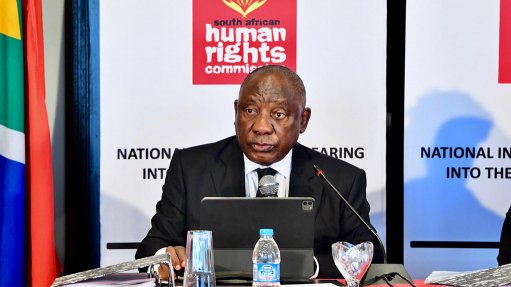
President Cyril Ramaphosa
President Cyril Ramaphosa says tribalism and ethnic discrimination were a serious cause for concern during the unrest that broke out in the country in July 2021.
During the chaos, like millions of South Africans, he followed "the many conversations, watched the video clips and listened to the audio recordings being disseminated".
"The conversations and hashtags in circulation at the time, saying things like #CyrilMustResign or #CyrilMustGo are all expressions of the right to free speech enshrined in our Constitution.
"But I, like millions of South Africans, have bitter memories of our past, where tribalism and ethnic chauvinism were used to promote hatred, and to divide. It is a time I never wish to see recur."
Ramaphosa added that conversations quickly became inflammatory.
"That is why being showed conversations saying things like 'iVenda alime kancane thina bantu bangempela sisalungisa izindaba zethu,' (The Venda must wait a bit while us real people fix our issues) and 'Thina angeke sibuswe nge Venda' (We won't be ruled by a Venda), went beyond being personally hurtful."
He was speaking at the South African Human Rights Commission (SAHRC) hearings in Johannesburg on Friday where the causes of the unrest are under investigation.
Ramaphosa alluded to previous SAHRC hearings where Melanie Veness, the CEO of the Pietermaritzburg and Midlands Chamber of Business, commented that graffiti was sprayed across a truck in Pietermaritzburg depicting the words: "Ramaphosa must go back to Venda.
He said it "hit a particular nerve".
"These words gave me cause for great concern. That tribalism, something the founders of the organisation that I lead, the ANC, sought to obliterate from the South African political and social landscape, was in this instance rearing its ugly head."
Ramaphosa said it "has been proven" that the tribalism sentiment was not shared by most South Africans.
"This is something I have acknowledged repeatedly, and will do so here again. What I do not agree with, however, is the allegation made in complaints received by this commission, that what I said [regarding ethnic mobilisation] could have led to the escalation of the violence and looting.
"A proper reading of my statements over those days, the chronology of when they were made, and an examination of the events that took place, clearly show this cannot be plausible. Notwithstanding the shortcomings of the state's response, culpability for the violence and destruction must lie with those who planned them and carried them out."
He acknowledged that the government was "poorly prepared for an orchestrated campaign of public violence, destruction and sabotage of this nature".
"What this country experienced was not a popular uprising of the poor, as the peddlers of misinformation sought to characterise it at the time," he added.
He conceded that despite intelligence reports, security forces were not prepared.
"Regardless of their intent, it was a situation for which we were not prepared. While there had been intelligence reports about the possibility of instability, neither the security services nor the government more broadly anticipated the nature, extent or ferocity of those events."